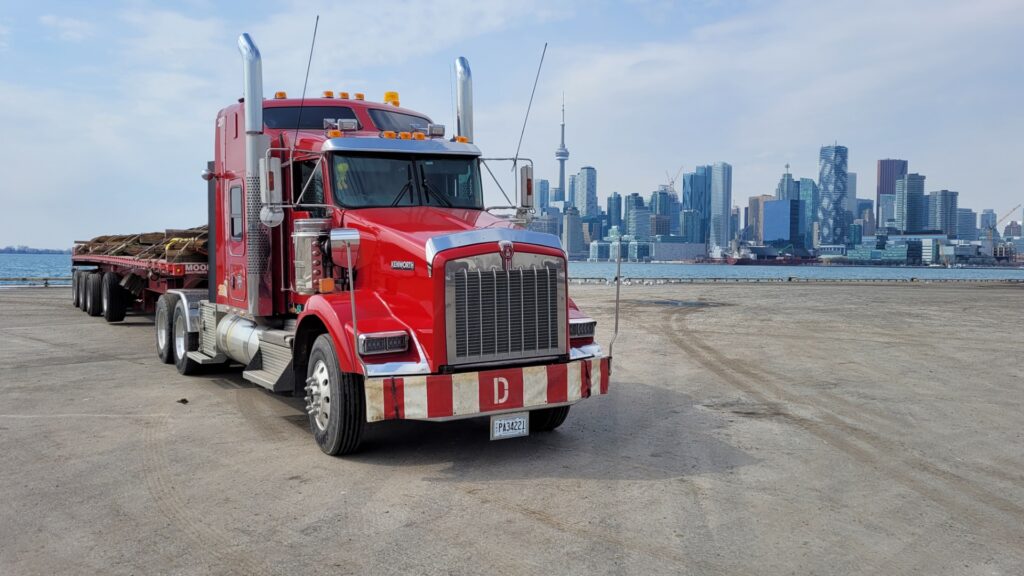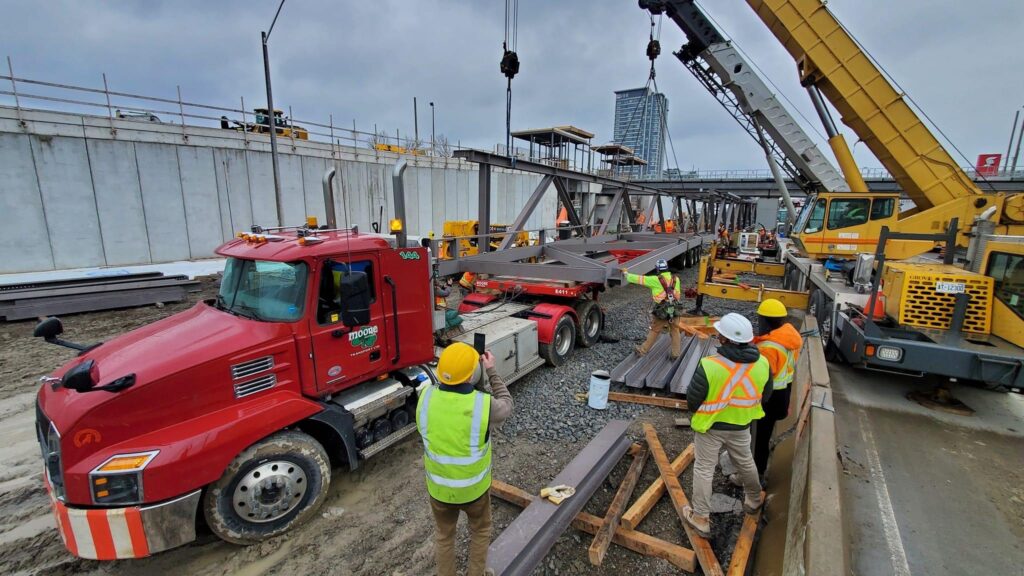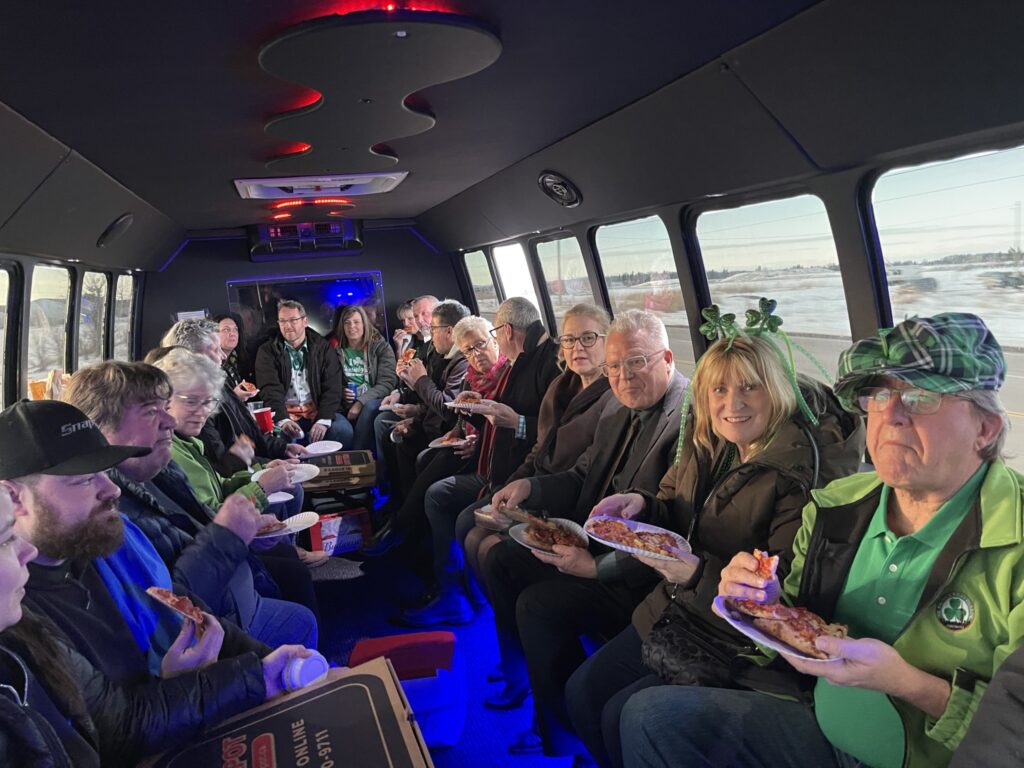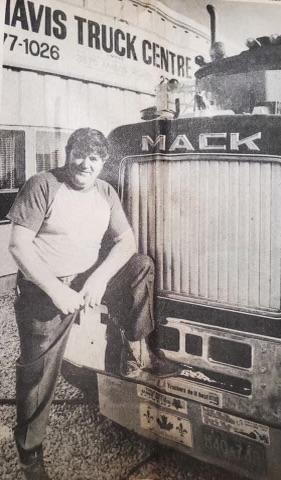Forged from crisis: How Moore Brothers Transport overcame adversity
It was early December in 2000, and there was a sharp knock at Sue Moore’s door.
She’d just staggered home laden with groceries and Christmas shopping, her two pre-school kids in tow.

She opened the door to find herself served with legal papers. Her husband, Ron Moore, was being sued for breach of fiduciary duty by the company that had just fired him. This was also the company that had absorbed the Moores’ family business the year before.
Sue stared at the papers and considered sinking into despair. And then she rolled up her sleeves and got to work.
This was the second of three great crises that ultimately forged Brampton’s Moore Brothers Transport into the success it is today.
Founded 24 years ago on a wing, a prayer, and six used trailers, today Moore Brothers runs a fleet of 45 company trucks and 150 specialized flatbed trailers. It also enjoys an enviable reputation for personalized service, safety, and reliability.
But it took a river of blood, sweat and tears to get there.

Crisis #1: Death of a beloved patriarch
Moore Brothers’ roots lie in the company founded by Ron’s father, Barry Moore. Barry was an old-school trucker who got his start as an owner-operator hauling bricks in the early 1950s. By 1956 he’d met a business partner, and together they founded a fledgling company. They called it Barry Moore Transport (BMT).
BMT grew steadily from the 1960s until well into the ‘90s. During this time, it became a true family business, with all four of Barry’s sons pitching in at one time or another.
All this changed in 1999, when Barry passed away unexpectedly. The company carried on as best it could for some months; however, by the time the legal dust settled, ownership of BMT had passed into the business partner’s hands.
Within six months, BMT had been acquired by a larger competitor. Shocked, Ron and his brother Garry (the two Moore brothers still on staff at the time) found themselves working for the new owners.
Crisis #2: The lawsuit
Sue, who was by now married to Ron but not yet working for the Moores, was busy with two kids and a full-time career of her own. She watched as Ron grew steadily more depressed after all this.
“He hated how powerless he was to help his former customers from within the bigger company,” she says. “Plus, it’s hard to watch your dad’s favorite old tractor just lying around someone else’s yard.”
The couple talked about doing something completely different. Buying a franchise, perhaps. Maybe a Pita Pit. Sue had been a baker in her younger years, and they looked seriously at buying a small bakery.

But it seemed the trucking industry wasn’t finished with them. Some of BMT’s old customers started calling Ron at home, begging him to go back into business. “The new company wasn’t able to give some of our old, niche customers the kid-glove handling they were used to,” explains Sue. “Eventually we started thinking there might be room in the market for both kinds of company.”
After a lot of soul searching, they decided to take the plunge. They mortgaged the family home, maxed out their credit, and formed a new enterprise: Moore Brothers Transport.
The only problem? The new owners of the old business didn’t take kindly to this. Which is how Sue ended up holding those legal papers at her front door on a snowy December morning in 2000.

Two decades of steady growth. But then …
Sue hired a lawyer and rode into battle. It took a while, but eventually the lawsuit was settled out of court. As part of that settlement, Sue and Ron were given a list of previous BMT customers they were not allowed to contact for two years. But otherwise, they were free to begin building the new business.
They soon found their instincts had been right, and Moore Brothers flourished during the next two decades. During this time they increased their fleet from six trailers to 25 trucks and 20-plus drivers. They opened a new location in Woodstock, Ont., took on many new customers, and worked with a consulting firm to improve their admin and ops structure.
But then…the pandemic happened. And while much of the world was stuck at home baking bread and watching Netflix, the transport sector had no such luxury.
“We were about to move to our current location where we now have a 20,000 sq.-ft. warehouse and four acres of land,” says Sue. “And we were called for so much work. We started expanding to fit the new location and cope with all the new business.”
They’d soon grown from 25 to 40 trucks, and from 20 to 45 drivers. But Sue admits the growth happened too fast. “We’d moved to electronic logging devices (ELDs) years ago. We’d installed speed limiters and all that jazz. But we weren’t enforcing any of it or using the data properly.”
Drivers were cutting corners and getting caught. Maintenance issues went unreported. Accidents were on the rise.
Crisis #3: MTO threatens sanctions
The day of reckoning came when the Ministry of Transportation of Ontario (MTO) served notice that changes would have to be made to avoid sanctions.
An equally serious visit from their insurance broker added to the urgency. “That was the scariest meeting I’d ever been in,” says Sue. “Just me, Ron, two other family members working for us, and seven stern-looking insurance investigators.”
Clearly, the time had come for change. Once again, Sue rolled up her sleeves and got to work.
Turning Moore Brothers around was tough. Here are the top things Sue and her team did to make it happen:
Education: Sue took a series of fleet safety courses offered by her insurance company. She sent several of her staff on the same courses, and later hired one of the instructors to work with everyone in-house.
Invest in people: Moore Brothers added an HR manager, a safety and compliance manager and a general manager. They bumped up driver wages, committing to pay by the hour, even while driving. They also developed an orientation program, a more rigorous application and road-test protocol for new drivers, and an in-house safety committee.
Invest in technology and safety equipment: They began to focus on data from the ELDs, speed limiters, in-truck cameras and telematics reporting. They started using a weekly report card system to monitor driver performance and ensure safety standards were met. This allowed them to identify and eliminate problem drivers, streamline maintenance, and focus on safety. The company also invested in the Drivewyze scale bypass system, allowing drivers to continue on past weigh scales without stopping.
“Be the brochure”: The company rebranded, and produced a new brochure focused on their core mission: specialized flatbed service; courteous, professional drivers; and timely, personalized service for every load.
“That brochure says we’re going to be there on time, have integrity, and be professional,” says Sue. “And that’s what we now expect from every member of our staff.”
Gig economy – a new crisis?
It all worked. CVOR points fell. Company morale rose. Insurance rates went down. And drivers brag their equipment is the best it’s ever been.
So what keeps Sue up at night now?
“There’s always ups and downs in this sector,” she says. “But this ‘Driver Inc.’ business is like nothing I’ve ever seen.”
She goes on to describe potential new workers who want to enjoy Moore Brothers’ driver perks and family atmosphere, but also want to be paid as gig employees. Sue won’t do it, knowing how destructive the practice is to the industry. But she says she knows she’s losing business to competitors who aren’t so principled.
Is she bitter? A little. “At Moore Brothers, we’ve done all the hard work. We dotted all the i’s and crossed all the t’s. We pay our taxes and run with integrity. I have to hope that’ll win out in the end.”
Have your say
This is a moderated forum. Comments will no longer be published unless they are accompanied by a first and last name and a verifiable email address. (Today's Trucking will not publish or share the email address.) Profane language and content deemed to be libelous, racist, or threatening in nature will not be published under any circumstances.
Well that is hard work for all involved at Moore Brothers. Way to go all. I knew Brian Garry and Barry as a young age working at Hansen’s in Brampton. Working on Barry’s pick up at Hansens shop. All the guys I knew at BMT were great people . Way to go all. Keep up the great work.I may of met Ron once or twice.
I hope does win in the end. This driver inc. Scam is not a good for the trucking industry or Canada at all
It has been a pleasure growing up together with Ron, his family and knowing Barry all those years between Feversham farm and mississauga. Keep up the great work and not letting anything stop you!
Brian Edwards
B. Edwards Transfer Ltd
Feversham, ON


Ron and Sue are fantastic to work with, honest as the day is long, and always there to lend a hand. It’s so great to see this story in Truck News. They are a big part of what makes working in the trucking industry so great. Thanks, Joanne, for taking the time to spotlight the Moore Brothers.